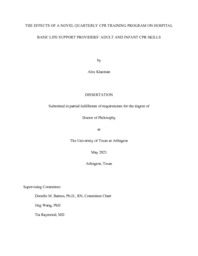
ATTENTION: The works hosted here are being migrated to a new repository that will consolidate resources, improve discoverability, and better show UTA's research impact on the global community. We will update authors as the migration progresses. Please see MavMatrix for more information.
Show simple item record
| dc.contributor.advisor | Barnes, Donelle M | |
| dc.creator | Klacman, Alex | |
| dc.date.accessioned | 2022-07-19T12:04:33Z | |
| dc.date.available | 2022-07-19T12:04:33Z | |
| dc.date.created | 2021-05 | |
| dc.date.issued | 2021-05-09 | |
| dc.date.submitted | May 2021 | |
| dc.identifier.uri | http://hdl.handle.net/10106/30755 | |
| dc.description.abstract | This article-based dissertation consists of two manuscripts related to the effects of a novel quarterly cardiopulmonary resuscitation (CPR) training program on hospital basic life support (BLS) providers’ adult and infant CPR skills over time at one hospital in Texas. The first manuscript was a retrospective cohort study of 109 BLS providers enrolled in the training program at the study hospital who completed four quarters of adult CPR skills with audiovisual feedback between January 1, 2017, and December 31, 2018. The primary purpose of the study was to examine the effect of the training program on BLS providers’ ability to obtain and maintain adult CPR skills over four quarters of the training program. The study utilized an existing analytics database that contained study participants’ adult CPR skill data. Analysis of the data revealed that BLS providers who failed to meet the CPR skill measures during the first quarter quickly improved their skills to meet the measure during the second quarter and maintained that performance over subsequent quarters. BLS providers who met the CPR skill measure during the first quarter maintained their performance over time. The results of this study suggest that the training program may be a viable option to help BLS providers obtain and maintain quality CPR skill performance over time.
The second manuscript was a retrospective cohort study of 116 BLS providers enrolled in the training program at the study hospital between April 1, 2020, and February 1, 2021, who completed a baseline infant CPR skill test without audiovisual feedback followed by three consecutive quarters of infant CPR skills with audiovisual feedback. The primary purpose of this study was to examine the effect of audiovisual feedback on infant CPR skills during three consecutive quarters as compared to their baseline skill test without audiovisual feedback. The study utilized an existing analytics database that contained study participants infant CPR skill data. Analysis of the data revealed that during quarter 1 of the training program, as compared to baseline, providers were more likely to meet the recommended infant CPR skill measure, suggesting that audiovisual feedback helps to correct poor infant CPR skill performance. During quarters 2 and 3, there were minimal to no improvements in CPR skill performance, suggesting that audiovisual feedback helps providers to maintain their performance over time. The results of this study suggest that the training program may be a viable option to help BLS providers obtain and maintain quality infant CPR skill performance over time.
This article-based dissertation concludes with the limitations of both studies and the implications for nursing practice. Future research directions are also discussed. In light of the findings of both studies, staff nurse educators should consider incorporating innovative CPR training programs that focus on spaced learning with immediate feedback, including use of the novel quarterly CPR training programs. | |
| dc.format.mimetype | application/pdf | |
| dc.language.iso | en_US | |
| dc.subject | Resuscitation | |
| dc.subject | Education | |
| dc.subject | Basic life support | |
| dc.subject | BLS | |
| dc.subject | CPR | |
| dc.title | THE EFFECTS OF A NOVEL QUARTERLY CPR TRAINING PROGRAM ON HOSPITAL BASIC LIFE SUPPORT PROVIDERS' ADULT AND INFANT CPR SKILLS | |
| dc.type | Thesis | |
| dc.degree.department | Nursing | |
| dc.degree.name | Doctor of Philosophy in Nursing | |
| dc.date.updated | 2022-07-19T12:04:33Z | |
| thesis.degree.department | Nursing | |
| thesis.degree.grantor | The University of Texas at Arlington | |
| thesis.degree.level | Doctoral | |
| thesis.degree.name | Doctor of Philosophy in Nursing | |
| dc.type.material | text | |
| dc.creator.orcid | 0000-0002-4151-5516 | |
Files in this item
- Name:
- KLACMAN-DISSERTATION-2021.pdf
- Size:
- 428Kb
- Format:
- PDF
This item appears in the following Collection(s)
Show simple item record


